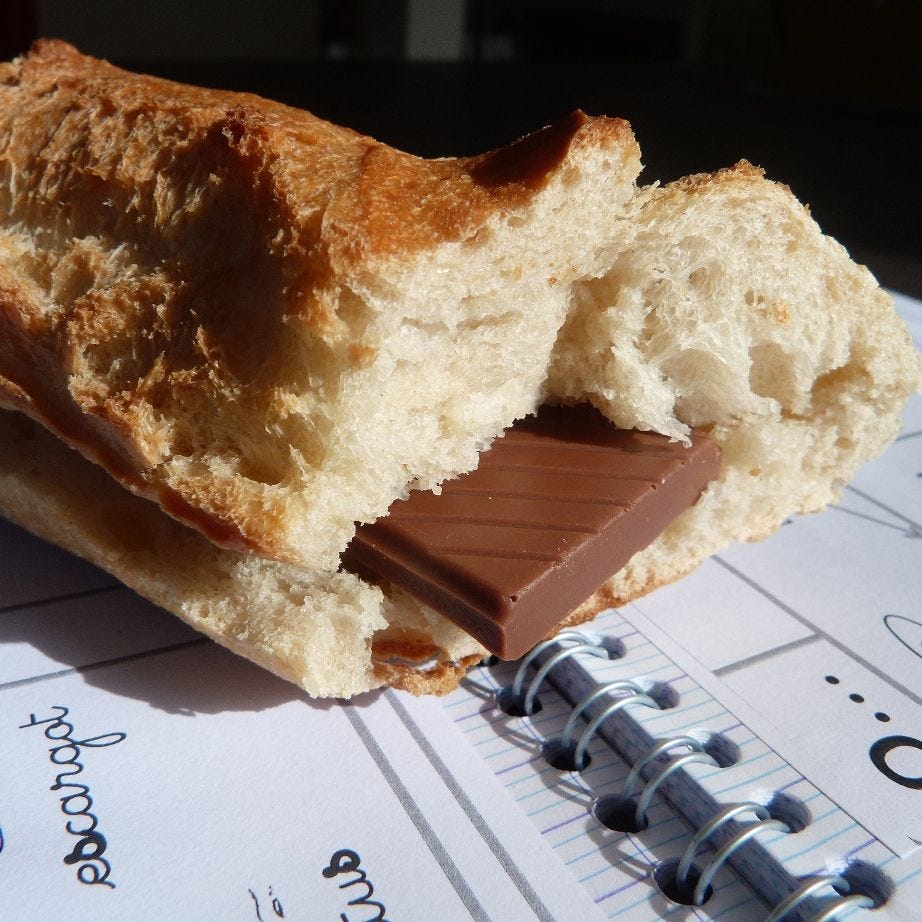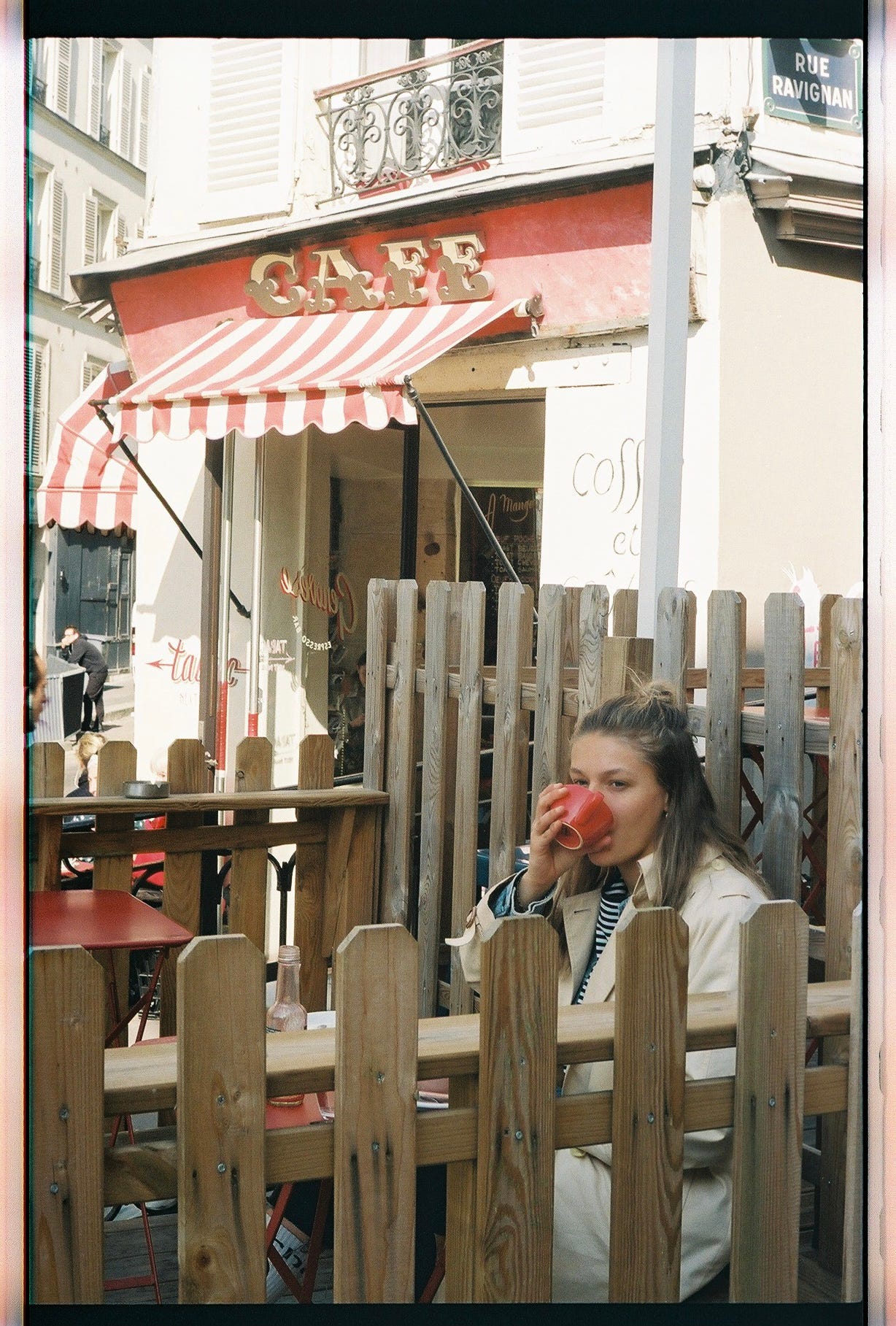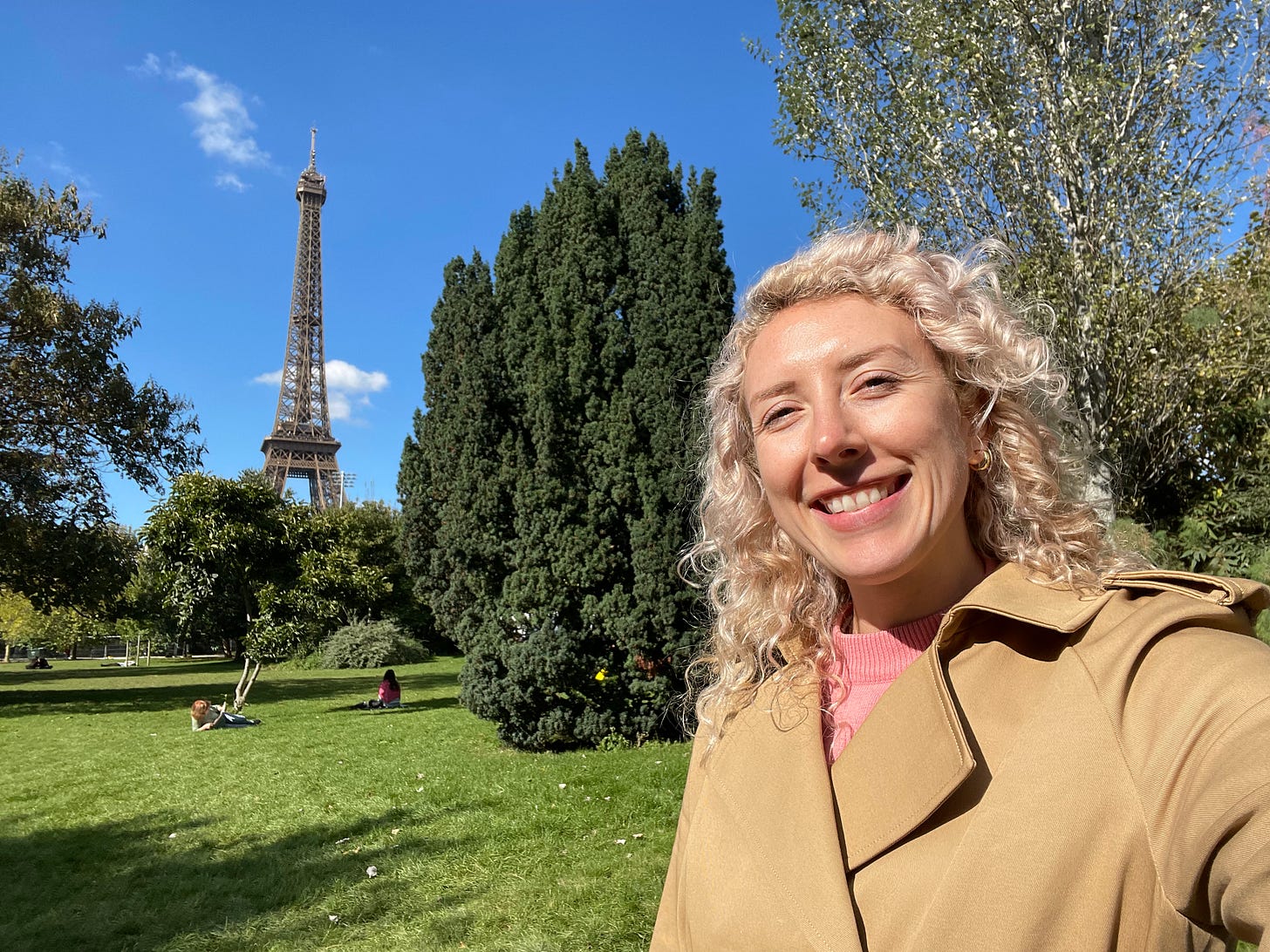eat like a parisian🇫🇷,"it's good for your brain"!
do you know the history of french breakfasts?
If you had asked me what Paris was like when I was a five years old, I would have said it was full of houses with ivy, orphanages, berets, striped shirts, wine, and cheese. This was mostly because one of my favourite books as a little one was Madeline by Ludwig Bemelmans. I loved to pretend I was a poor orphan and couldn’t wait until I would need my appendix removed, just like the titular protagonist!
This curiosity of France grew stronger with every book and movie I consumed. I even became rather afraid of it after the episode “The Crepes of Wrath” on The Simpsons where Bart becomes an exchange student in France and things do not go so well…
Do you have a relationship to France? Have you been? Do you want to? I’m so excited to follow my gut in exploring France and neuroscience with you! Get curious with me, and let’s see how learning about a different culture can expand our own world.
There are so many different paths we could take to start this adventure, but I will be starting in PARIS and with what everyone will want to do as soon as they get off the plane…EAT!
🥐The French (External) Toolkit:
If you’re from North America, most restaurants open in the morning and then stay open until the wee hours of the night. However, the French are a little more particular about their eating times!
When you go to Paris for the first time, you may have to plan your eating timetable if you wish to partake in some of the best cooking in the world; most traditional restaurants only serve lunch and dinner, and are closed from 14:00-19:00 (2PM-7PM). If a restaurant stays open during this time, that might be a red flag to avoid it!
Here’s a guide to add to your toolkit for a more authentic experience in Paris (and to avoid disappointment or hangry-ness!):
Petit déjeuner (breakfast): Parisians traditionally only have a coffee (café) and croissant from their local bakery (boulangerie) - not to be confused with a restaurant! However, in the very worldly Paris I’ve noticed brunch at restaurants has become increasingly popular, especially close to the Montmartre area. Additionally, more and more science in France (like from the French biochemist Jessie Inchauspé - @glucosegoddess on Instagram) is convincing people to eat a full nutritious breakfast.
Okay. WHY isn’t breakfast a traditionally a popular meal in France? Good question! I asked it myself!
Here’s a quick and interesting history lesson of why breakfast isn’t so common in France:
Apparently during medieval times, the church and elite looked down upon those who ate breakfast because it meant they were either SINFULLY gluttonous who could not control themselves, or a peasant (☹️!) who needed the extra fuel for their laborious career. Therefore it was more upper-class, glamorous, and showed an approving trait of self-control to not “break” your “fast” until lunch. Additionally, many followers of Catholicism believing that one should not eat before completing work/“offering the day to God.”
However, during the 18th-19th centuries, once trade was more common and the introduction of coffee, tea, chocolate, and sugar was made to France, these goods were first sold in apothecaries and viewed as ~medicinal~. Because they were consumed as liquids (coffee, tea, and hot chocolate), they were viewed as healthy (not gluttonous), respectable, and not really “breaking fast” the way solid food would.
THEN! Louis the XIV and XV encouraged drinking coffee and hot chocolate in the morning for an intellectual and physical advantage, thus enforcing it a “sophisticated” habit; aiding digestion and sharpening the mind.
Later, post-French revolution, the common people could finally have access to bread again (hallelujah!). For example, during the Industrial Revolution (19th century), people could use ELECTRICITY, thus not relying solely on daylight, and began to take advantage of the boost that the calories in bread, and caffeine in coffee and chocolate (not to mention the sugar in it!) would give if they started their workday with these additions.
So, historically, French people don’t emphasize breakfast the way the Germans, English, or North Americans do, especially not in a “provided at every restaurant” kind of way. This is why, if you want to accustom to the “French way” for a fun experiment, save your appetite for lunch!
Déjeuner (lunch): most restaurants are open from 12:00-14:00. This is usually the heaviest meal of the day and when you can find the most affordable prices. Don’t be afraid to try to the “menu du jour” (meal of the day) or “menu à prix fixe” (fixed price menu that includes a few different dishes) if you don’t have allergies! French chefs (btw did you know “chef” actually translates to “boss” in French?) often make their freshest ingredients of the day into their daily feature at a good price, so it’s a win-win for the adventurous!
Now, I’m going to introduce two VERY Parisian traditions that happen after lunch, but before dinner:
LE GOÛTER (SNACKTIME!): This is a really cute french tradition that I think totally encapsulates the French’s seriousness about enjoying food: from about (16:00-17:00) kids and adults traditionally have a “goûter,” AKA a SNACK! This usually means a pastry or crêpe for both kids and adults! Sign me up!! A very nostalgic snack is apparently a baguette with a chocolate square. Of course, many parents now give their children healthier snacks, but as the French diet is traditionally very well-rounded and not full of processed foods in general, they can indulge in a sweet pick-me-up guilt-free.

Adults will often accompany a goûter with an espresso…and boulangeries (who often sell coffee too!) will still be open at this time for a delightful treat!
Also, just a side note…there really is nothing that can compete with french butter! So if you can eat wheat and dairy, PLEASE indulge in this tradition for me! As the orphans say in Madeline: “We love our bread, we love our butter, but most of all we love each other.”
Apéro! Parisians love their apéro hour(s), from about 18:00-20:00…after work and right before dinner. This is what us North Americans would consider a “happy hour” after work. Even if you don’t drink alcohol, it’s such a romantic experience to wander around Paris during this time while everyone is digesting their day with a cocktail and savoury snack before dinner. Plus Paris is getting better at providing mocktails!
Dîner (dinner): Most restaurants will open back up around 19:00, but a lot of Parisians won’t eat until 20:00/21:00. SOME places even serve a LATE late night dinner around 23:00 which will help if you’re jet-lagged, but it’s best to check Google Maps before heading to a specific spot as this isn’t super common!
✨K-Tip: My tip for adjusting to the Parisian food life is to not take it so seriously. Have fun experimenting, and don’t worry too much about following all the “rules!” For example, I actually have a lot of food sensitivities that prevent me from eating out, because in France they’re often not very happy about making substitutions for their meals. In North America we have a very large population of people who can’t eat certain things, and most restaurants have learned how to respectfully take this into account. HOWEVER in France, food is often seen as an art from, so to change an ingredient means that the dish would not taste as the chef intended it to, and they would be insulted to have their dish be imperfectly served. So if you have dietary restrictions, it’s actually considered rude to expect the restaurant to conform to them. This has led me to make a lot of my own meals…but with super high-quality French ingredients that taste SO much better!
One of my favourite things about France is actually their grocery stores! Not only are they full of high quality items due to French laws, but even in Paris, most French essentials (cheese, wine, a baguette, and charcuterie) are way more affordable than North American prices. So, if you find yourself hangry while the restaurant you want to check out is closed, don’t fret! Just head to the many open grocery stores or boulangeries and assemble the most delicious picnic! Paris has tons of parks and green spaces to enjoy this tradition that Parisians share as well. In fact, many working Parisians take their lunch to-go and love to enjoy one of their many beautiful parks on their lunch break. You’ll fit right in! However, if you do decide to indulge in some wine- don’t forget your bottle opener! Here’s a video from my lunchtime in the spring:
🌿The Wellness (Internal) Toolkit:
It was a long held belief that one’s brain stopped developing after your 20s. However, while there is still some debate on the brain’s ability to grow new neurons indefinitely (neurogenesis), it’s widely accepted that we can totally create new connections between existing neurons no matter how old you are (neuroplasticity)!
In other words, if you want to change your current habits, or develop new skills, your brain can create new connections between neurons through repetition of thought and/or action to make this possible. The more that we practice the new habit or new skill, the stronger that connection becomes. For example, if you’re trying to learn french, and repeat repeat repeat new words every day, eventually the words come to you automatically because your brain has wired itself in this new way. This is so exciting, because it means that no matter what age you are, you can still learn new skills, change (aka REWIRE) any bad habits you wish you could let go, and essentially become an old dog who can learn new tricks! The more often you create new connections in your brain, the easier it gets to make new connections! You’ve made learning new skills, itself a new skill! 🤯
Why am I talking about this in this new travel series? Because there are ways we can help our brains to make new connections more easily. The biggest one is…through our environment! Travelling is so good for our brains when we do it mindfully! When we travel, our brain is forced to think differently and make new connections, because you are disrupting your everyday routine at home where it’s on autopilot. Even if you use apps that don’t make your brain work that hard (ex. Google Translate, Google Maps), there is still a lot of good stuff going on in there 🧠 just by simply observing a country’s customs and being a foreigner.
🌞Quick example: when I lived in Mexico I was surprised that I had no trouble waking up as soon at the sun rose for a couple of reasons:
It was sunny almost every day, so it didn’t hide behind dark clouds like my hometown Vancouver’s sun for most of the year.
Mexico is closer to the equator than most places I’ve been to, so there isn’t a huge time change for when the sun rises from season to season; it’s almost always around 6:30-7:30am which makes the habit easy to keep consistent!
Although it’s such a small thing, adjusting your meal times and what you eat to adjust to the Parisian lifestyle, might have big effects on your life when returning to your home! Here are some ways the outer world (eating times in France) can positively impact your inner world by not only making new neural pathways, but exploring what does and does not work for you:
having a lighter breakfast might make you feel more energized
having a breakfast heavy in carbs might give you a sugar crash
having lunch as your biggest meal might help you digest easier
having lunch as your biggest meal might make you want a siesta
having a late dinner might make you have a bad sleep
having a late dinner might make you feel like your day lasts longer
eating one rich sweet goûter with high-quality ingredients might satisfy your appetite longer (and be more enjoyable!) than a bunch of processed low-calorie snacks throughout the day
having so much bread and cheese might make you feel terrible (lol- though I know MANY people, including myself, who have said that their wheat intolerances disappear in Europe because it’s processed better than in North America)
making sure you only cook with high-quality ingredients from local farmers (as most French do) might help your body absorb nutrients better
drinking after work might make you eat too much and not sleep well
having a social gathering after work might uplift you
Life is all about experimenting, and eating habits is one of the many fun things we can test out to see what works best for our bodies and lifestyles! Get curious, exercise your brain, and see if adjusting any of your current eating habits improves your daily life!
Thank you so much for reading this far! Did you learn anything new? Please let me know! I can’t wait to share all of my adventures of learning and living in Paris with you! À la semaine prochaine!
Bisous, Kaja xx 🇫🇷








I loved reading the history behind the French breakfast! I’m American and idk if I’ll ever catch on to it 😅